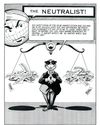Prøve GULL - Gratis
Is Online Illness Culture Keeping People Sick?
Reason magazine
|April 2023
WHILE THE FDA KEEPS EXPERIMENTAL TREATMENTS OUT OF REACH, THE SPOONIE WORLD MAKES A DIAGNOSIS INTO AN IDENTITY.

BEFORE THE PSYCHOTIC break, the fistfighting, and his life’s eventual devolution into an anarcho-terrorist fever dream, the nameless narrator of Fight Club spends his free time attending support group meetings for diseases he doesn’t have. Lymphoma, tuberculosis, parasites, cancer: It’s not about the condition, but the catharsis of being in a room with people who are suffering and see each other’s suffering. They sip coffee. They make confessions. They hold each other and cry—and then they go home, knowing they’ll be back next week to do it all over again.
In the context of the movie, this is understood to be an absurd spectacle of human pathos. This is, after all, a film whose narrator eventually finds that beating other men to a pulp with his bare hands is a far better cure than communal crying for his male existential malaise. But it also reveals something deeper about the human condition, how sickness can become the lens through which we understand ourselves. There’s a sense of community, of nobility, of a certain dignity in these spaces, where it’s OK not to be OK. Like the movie says: “When people think you’re dying, they really, really listen to you, instead of just waiting for their turn to speak.”
Kelly Owens, author of the Wandering Nerve newsletter, is well-versed in the dynamics that govern the spaces where people with chronic illness gather, in part because she was once one of them. What she sees is an online culture that serves as a valuable resource and source of community to many, but has become increasingly invested in the idea of disability as an identity— sometimes at the expense of scientific curiosity, of innovative research, and of hope for a cure.
Denne historien er fra April 2023-utgaven av Reason magazine.
Abonner på Magzter GOLD for å få tilgang til tusenvis av kuraterte premiumhistorier og over 9000 magasiner og aviser.
Allerede abonnent? Logg på
FLERE HISTORIER FRA Reason magazine

Reason magazine
A Nostalgic Read for Foreign Policy Elites
IF YOU WERE looking for a human avatar of America's unipolar moment, you couldn't do better than Michael McFaul. Picture a youthful, energetic McFaul with a newly minted Ph.D. bounding into the suddenly post-Soviet space of the early 1990s, full of bright ideas about democracy and faith in the end of history. As McFaul himself puts it, 1991 \"was a glorious moment to be a democratic, liberal, capitalist, multilateralist, and American....I was treated like a rockstar.\"
4 mins
January 2026

Reason magazine
TRUMP IS DEPORTING ENTREPRENEURS
THE TRUMP ADMINISTRATION'S MASS DEPORTATION EFFORT IS ROBBING THE U.S. OF IMMIGRANT BUSINESS OWNERS AND THEIR CONTRIBUTIONS.
9 mins
January 2026
Reason magazine
The First Information Revolution
PRINTING PRESSES AND LIBRARIANS INTERPRETED CENSORSHIP AS DAMAGE AND ROUTED AROUND IT.
11 mins
January 2026

Reason magazine
What Would Bill Buckley Do?
THE NATIONAL REVIEW FOUNDER'S FLEXIBLE APPROACH TO POLITICS DEFINED CONSERVATISM AS WE KNOW IT.
7 mins
January 2026

Reason magazine
MAHA Mandates Food Labels
BURDENSOME FOOD LABELING mandates were once the province of Democrats, who pushed for calorie count requirements on restaurant menus and insisted packaged food must feature warnings about genet- ically modified ingredients and trans fats. Now it's Republicans leading the charge- with equally foolish results.
2 mins
January 2026

Reason magazine
IS JAKE TAPPER DOOMED?
THE CNN ANCHOR ON THE WAR ON TERROR, THREATS TO FREE SPEECH, AND THE FUTURE OF MEDIA
14 mins
January 2026

Reason magazine
REPUBLICAN SOCIALISM
THE TRUMP ADMINISTRATION IS BUYING STAKES IN COMPANIES. THAT NEVER ENDS WELL.
13 mins
January 2026

Reason magazine
A Taste of Capitalism in Warsaw
WARSAW, POLAND, IS a living museum of economic systems. It's a city where concrete reliefs of stoic factory workers decorate a building that now houses a Kentucky Fried Chicken, where a Soviet-era apartment block stands beside a glass tower filled with coworking spaces.
2 mins
January 2026

Reason magazine
Robert Crumb's Roving Art and Life
IN THE SPRING of 1962, an 18-year-old Robert Crumb was beaned in the forehead by a solid glass ashtray. His mother, Bea, had hurled it at his father, Chuck, who ducked. Robert was bloodied and dazed, once again a silent and enraged witness to his family's chaos.”
5 mins
January 2026

Reason magazine
THE HOWARD ROARK OF COMICS
SPIDER-MAN CO-CREATOR STEVE DITKO WAS A GREAT EXAMPLE OF, AND DIRE WARNING TO, OBJECTIVIST POP ARTISTS.
12 mins
January 2026
Translate
Change font size

